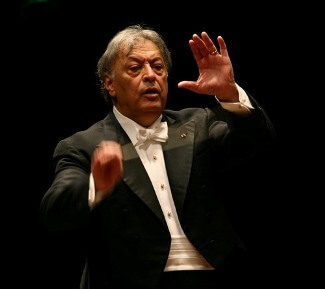
Last week, The New York Times music critic Anthony Tommasini praised Zubin Mehta for his courage and Israeli political culture for its freedom in an article about musicians responding to political challenges:
A recent example of a principled artist speaking out took place when the conductor Zubin Mehta presented a concert at Carnegie Hall with the Israel Philharmonic Orchestra. Mr. Mehta, its music director, is a revered figure in Israel. Yet in an interview with The New York Times before the performance, Mr. Mehta, speaking from ‘my private musician’s perspective,’ as he put it, challenged certain policies of the Israeli government that were taking it in a ‘wrong direction,’ he said, especially regarding the settlements.
It takes nothing away from Mr. Mehta’s forthright comments to suggest that he has less at stake than Mr. [Valery] Gergiev [who has criticized Putin]. Israeli culture has long encouraged fierce internal debate of all national policies, especially within the Knesset, its legislative body.
It’s not the first time Tommasini has promoted Israel and Mehta. In an review of the Israel Philharmonic concert at Carnegie Hall published on March 21, titled “The Tentative, the Vibrant and Then the Impassioned,” Tommasini said the following about the Indian-born conductor, in what appears as out of place and inappropriate as a shrimp salad at a Passover seder:
Mr. Mehta has long been revered in Israel for his work with the orchestra, but his prominence has not stopped him from criticizing government policies [link in the original] when he sees fit.
The praise for Mehta’s political courage and forthright dissent and for the open-mindedness of Israeli society began with a March 19 piece by The New York Times music writer, Corinna da Fonseca-Wollheim titled “Political Views Test the Harmony,” in which she quoted from an interview she did with the conductor.
‘I have such a love for this country, Israel, that I see it as a tragedy what’s going on,’ the Mumbai-born Mr. Mehta, now 77, said recently at the Pierre Hotel, a few blocks from Carnegie Hall, where he will conduct an Israel Philharmonic benefit concert on Thursday. ‘I speak openly about a country that I see, from my private musician’s perspective, as going in the wrong direction, as far as the settlements, as far as internal economic policies. But they know I’m a friend. And being in a democracy, I express my opinions freely….’
‘I’m a very involved person,” said Mr. Mehta, who is not Jewish and continues to hold Indian citizenship. ‘Many of my colleagues are not. But I have my own opinions about what goes on and what should happen.’
As I wrote in a post criticizing da Fonseca-Wollheim for her ill-conceived praise of Mehta, the fact is the Mehta has spent his career assiduously avoiding criticizing Israeli government policies — whether they are unbridled military aggression such as its two Lebanon wars and Operation Cast Lead or the ongoing settlement policy in the West Bank and Golan Heights with its related dispossession of the indigenous population.
What’s more, Zubin Mehta is not Jewish, has never lived in Israel, does not speak Hebrew, and has spent the majority of his career conducting orchestras in Europe, especially in Germany where his fluent German has allowed him to communicate with his audiences and players as he is unable to do in Israel. Mehta, whose lifelong association with the Israel Philharmonic began in the 60s, has expressed a love for Israel that I am sure is honestly held. But the fact that the great conductor has always spent most of his life and career elsewhere is not always clear to the readers of these New York Times articles. And it could explain why Mehta has not been publicly identified with any strong political position about Israel and its politics. This is especially understandable since Israelis are known for resenting political criticism from foreigners no matter how attached to the country they may be.
The Israeli Philharmonic is one of the most effective public relations tools Israel possesses. Mehta, who has been its music director since 1977, is one of Israel’s foremost goodwill ambassadors. When the orchestra performs in New York City it makes sense that the conductor would promote it by stating “his opposition” to the settlements and how Israeli society is open to such criticism: It is what the orchestra’s mostly Jewish and liberal Zionist audience wants to hear. Whether Mehta’s words are honest or merely good p.r. is something that an astute reporter should have considered.
Why did The New York Times reporters and editors pass along Mehta’s word that he was an outspoken critic of Israel and that Israel is open to his alleged criticism without even raising an eyebrow? Why did Anthony Tommasini repeat Mehta’s claims in two additional columns when the claims were not germane to those two subsequent columns?
Maybe because it’s in the water. Because you get pro-Israel attitude from Isabel Kershner, Jodi Rudoren, Ethan Bronner and Thomas Friedman, and the editors of The New York Times Book Review, and even a reporter who generally doesn’t cover Israel feels the need to skewer Jimmy Carter as a radioactive loser in an arts column.
If one were a bit prone to paranoia one might conclude that the series of articles referencing Mehta was orchestrated.
P.S. FYI, Corinna da Fonseca-Wollheim is married to the prominent pro-Israel Wall Street Journal columnist, Bret Stephens.


Good article Ira. The comments section of Times articles on I/P has to give the Times management something to worry about. If their paper is more widely understood as a Zionist propaganda machine people will stop buying it. Bill Keller offered a mea culpa of sorts following the Times’ failures in the run-up to the Iraq war. No such apologies or justifications have been seen wrt the Times devotion to Zionism. It just goes on and on and its readers are starting to notice.
We live in a time when lukewarm dissent is honored as if it were big-time stuff. Perhaps this is the sad result of so little hot dissent from people with something to lose.
It would — from my BDS perspective — be quite something if Mr. Mehta resigned from his Israel connections in a BDS-like demonstration that — in his opinion (I cannot of course speak for him) Israel’s settlements policy and (by now) its policy of indefinite occupation are impermissible and require all principled people to withdraw their support for Israel until these matters are entirely corrected.
But such things don’t happen often, haven’t happened here, and will beall the more noteworthy when they ultimately do occur (if ever).
We live in a time of ultimate denial: and nothing but denial can explain the broad refusal of decent people to speak truth to power on: I/P (a small matter, although dear to us few including Zionists among “us few”) and global warming/climate change (GW/CC), a dreadful calamity that will make the holocaust (for example) pale in comparison. In each case, the relevant facts have been available for a long time and those who cozy up to power (or who value a conflict-free lifestyle) have learned to practice a reticence which makes of denial a virtue.
One wonders where the religious leaders are, if not on I/P, then on GW/CC?
Picking at the NYTimes over cultural aspects of its pro-Israel bent is fine, but Thomas Friedman just called Sheldon Adelson Iran’s best ally in destroying Israel! Called him a swaggering oligarch! Identifies him as what’s wrong with politics in both Israel and the US. In the NYTimes Sunday Review. This is all over Haaretz, Jerusalem Post. This is big, Big, BIG! Not to criticize my favorite source for the war of ideas on the middle east, but don’t wait too long.